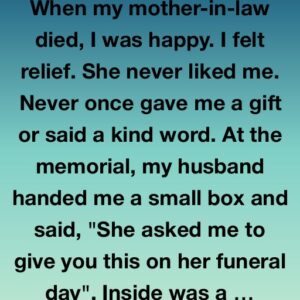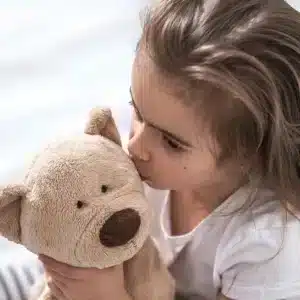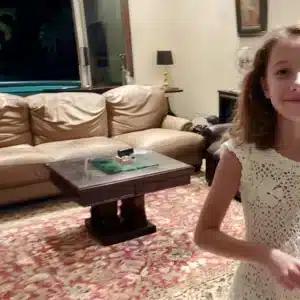Mom left when I was three. That’s the age everyone tells you kids won’t remember, but I did—just flashes. The thud of a duffel on tile. The smear of lipstick on Dad’s favorite mug. A note on the counter that looked more like a receipt than a goodbye. After that, it was just me and Dad. He never trashed her, never turned my hurt into a hobby. He just told the truth: she left, and he stayed.
Fifteen years later, I was in the frozen foods aisle debating waffles vs. pancakes when a girl about my age stepped into my path. “Are you Zavi?” she asked, eyes soft but steady. “I’m Rina. I’m your sister.” The word sister hung there, fragile and impossible.
Before I could answer, she tilted her chin toward the end of the aisle. “She came too.” I followed her gaze and forgot how to breathe.
The woman standing there looked like someone trying on my mother’s face. Long white coat, curls too perfect to be accidental, lipstick that didn’t belong to her skin. Hands clasped like a student at roll call. “Zavi,” she said, and my name sounded wrong in her mouth, like a word she’d learned five minutes ago. “I’m sorry. I didn’t know how to find you. Can we talk?”
I didn’t say a word. I walked out with empty hands and a heart that felt like a locked room.
That night, I sat on the porch with an orange soda and thought about Dad teaching himself to braid from YouTube, about the lunches he forgot and the love he never did. In the morning, I told him what happened. He stirred his coffee like he was remembering something heavier than sugar. “You don’t owe her anything,” he said. “But if you want to talk to her, I’ll back you up.” That was Dad. He never moved me. He made space for me to move myself.
A week later, I messaged Rina. Her Instagram was beaches and cappuccinos and a fluffy dog named Mango. Normal. Disarmingly normal. We picked a park—neutral, open, no exits you could mistake.
Rina showed first. She handed me a smoothie and the kind of careful smile that says, I don’t know the rules yet. “I’ve known about you since I was ten,” she said. “Mom told me it was… complicated.” That word again. The trampoline adults use to bounce over the truth.
“She said she left because she wasn’t happy,” Rina went on. “She regrets not coming back sooner.” I let the words pass by like traffic. Then she added, “She’s sick.” Stage three breast cancer. Chemo last month. Not a baited hook—just a fact placed gently on the table between us. It knocked the wind out of me.
I agreed to meet her mother. Their apartment looked like someone had arranged it from a distance: tidy, staged, a life smoothed into a hotel room. She sat in a recliner with a blanket over her knees, scarf tied neatly, the outline of her skull soft and unfamiliar. Smaller than any memory I had. “Hi, Zavi,” she said. “You look just like your dad.”
I didn’t want her to know that. I didn’t want her to see anything in me that she could claim. I asked the question that had been waiting in my mouth for fifteen years. “If you thought about me every day, why didn’t you call? Or write? Anything?”
“I was ashamed,” she said, voice thin. “I told myself you were better off. Then it got later and later, and I decided it was too late.” I heard myself snap before I could stop it. “But now you’re sick, and suddenly it’s not?” She flinched and didn’t defend herself. “I was selfish,” she said. “You don’t have to forgive me. I just wanted to see who you became.”
I stayed an hour. I talked about school and my job at the record store. I talked about Dad. Every time I said his name, something tightened in her chest. “He’s a good man,” she said softly. “You were lucky.” “He was the lucky one,” I shot back, then wished I hadn’t. She nodded anyway, like she agreed.
After that, I didn’t promise anything. But Rina texted. Not often—just enough to keep a thread between us. The thread wound itself into small favors: vet runs with Mango when chemo made driving impossible, dropping off soup, installing a shelf while she watched like I was doing a magic trick. One afternoon she pulled a yellow baby blanket from a drawer, frayed edges and old sun in the weave. “I kept this,” she said. I didn’t remember it, but my hands trembled when I held it.
The armor I’d worn for years didn’t fall off. It loosened. When her hair started coming out in handfuls, I helped her shave the rest. Three of us in a small bathroom—me, Rina, and her reflection. Rina cried. So did I. “I deserve this,” she whispered to the mirror. “No,” I said, and for the first time, I meant it.
We didn’t autopsy my childhood. She didn’t pretend it hadn’t happened. Some days she just asked about my shift at the store and whether Mango liked the new treats. Some days she told me about the man she married after Dad. “He made me feel chosen,” she said. “I thought leaving would fix what I didn’t like about myself.” It didn’t sound like an excuse. It sounded like a diagnosis.
Months slipped by. She got worse before she got better. Then the scan said remission and the air got a little easier to carry. She invited a few people over—Rina, her partner (who was decent in the ways that matter), some neighbors, and me. Midway through dinner, she stood with a glass of sparkling juice. “To my girls,” she said, then lifted her glass higher. “And to the man who raised one of them without me. To Bassem.” Dad’s name, said like a thank-you.
“I’d like to thank him in person,” she added, eyes on me. “If he’d allow it.”
When I told Dad, he didn’t hesitate. “Invite her,” he said. “If she’s sincere, I’ll hear her out.” A week later they sat at our old kitchen table—the same one that held her note sixteen years ago. I made tea and left them alone with their ghosts. An hour passed. Then another. She came out with red eyes and hugged me. “You were raised by a better person than me,” she whispered. I didn’t argue. I didn’t have to.
That was the day I forgave her. Not because she’d earned it, but because I didn’t want to haul her choices any farther. She stayed in our lives like a guest who understood the house rules—gentle, careful, always asking before she crossed a line. She came to my graduation and cheered like a stadium. We took a photo—me in the middle, Dad on one side, her on the other, arms looped. It wasn’t a fairy tale. It was honest.
Here’s what I know now: people break things—promises, families, themselves. Sometimes the break is so clean it feels permanent. But time and sincerity can file down the sharp edges. Forgiveness isn’t forgetting, and it’s not approval. It’s setting a bag down that you never should’ve been carrying. And if someone shows up broken and honest, sometimes the kindest thing you can do is hand them a chair and let them try.
If this landed somewhere you recognize, share it. Someone else might be standing in a freezer aisle, trying to choose between waffles and pancakes while their past walks up and asks their name.





